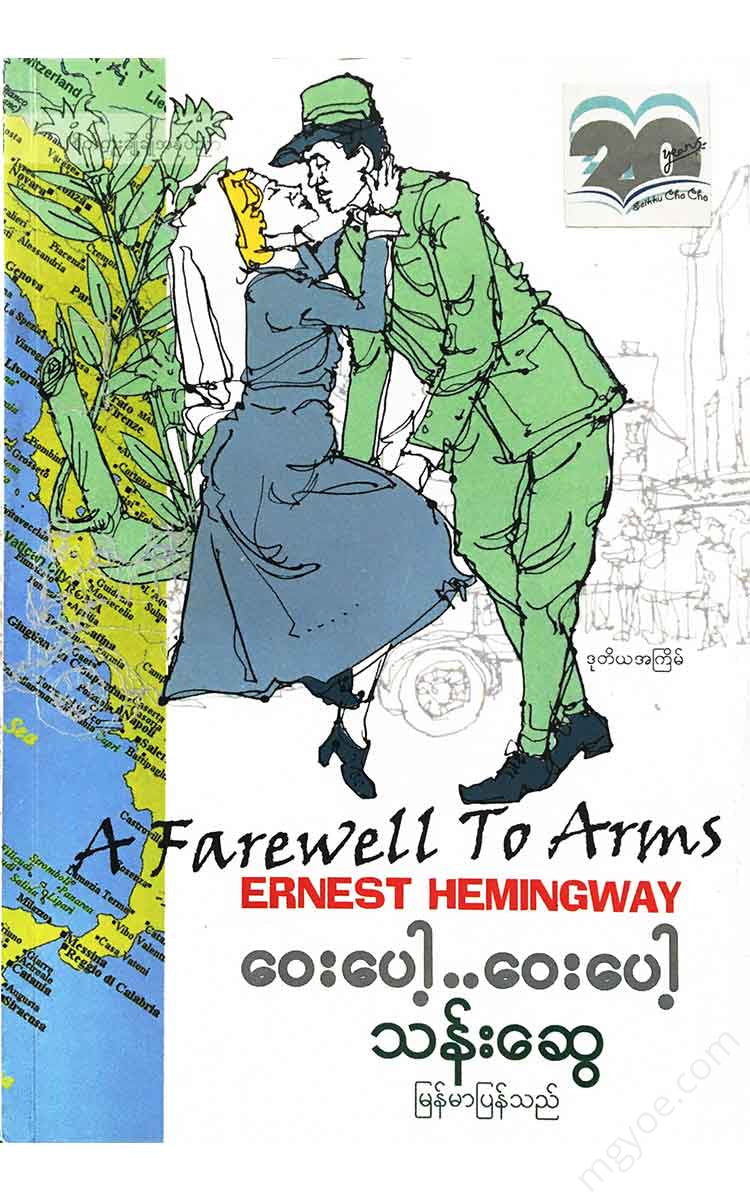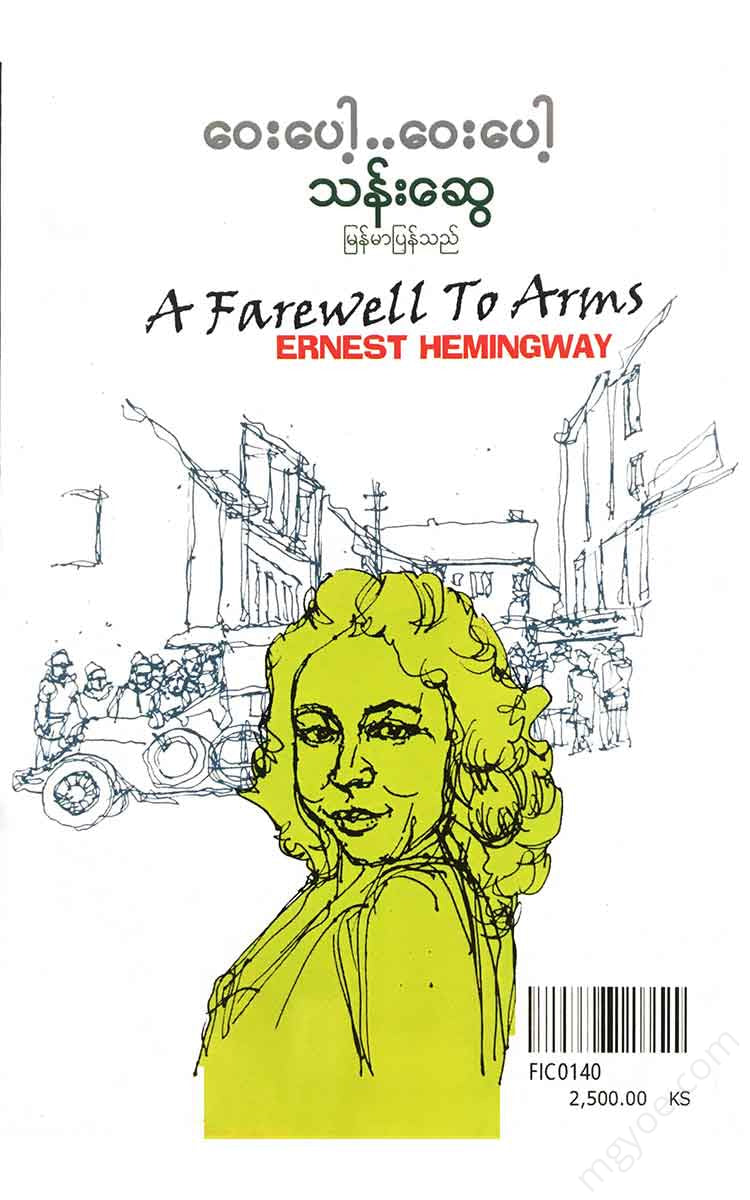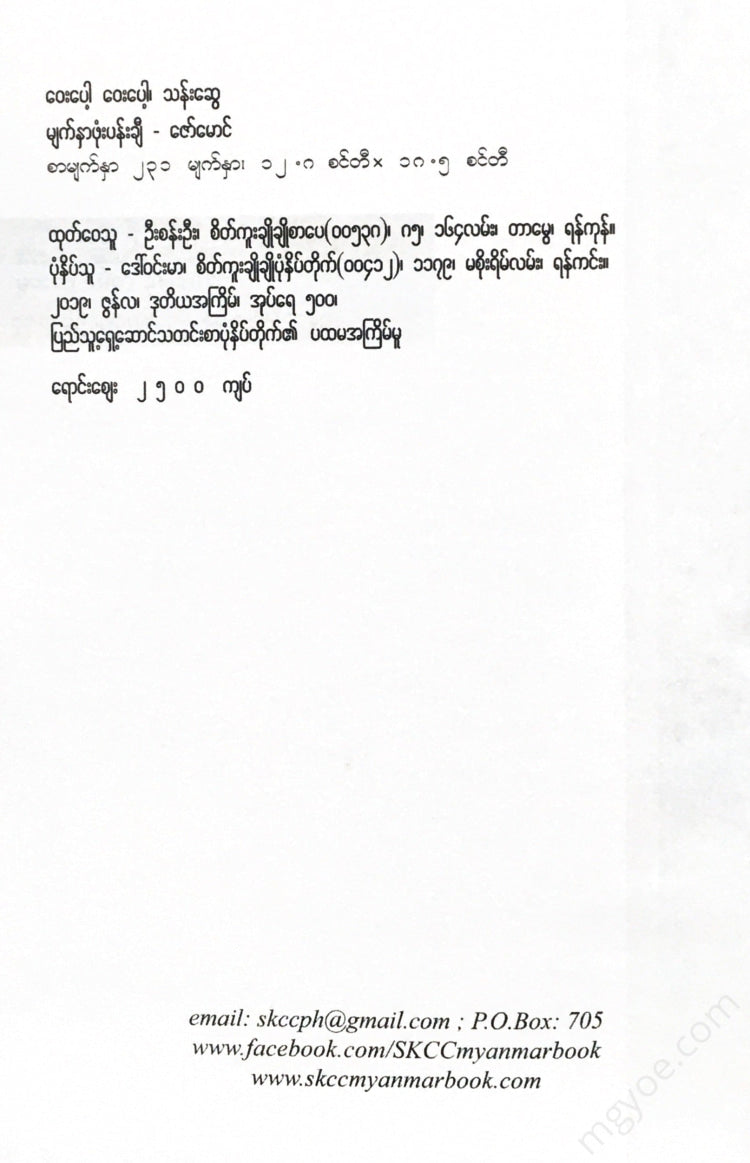စိတ်ကူးချိုချိုစာပေ
Than Swe - 0wow 0wow
Than Swe - 0wow 0wow
Couldn't load pickup availability
(1)
That summer, we lived in a house in a village in the Veneto region of Italy, on a flat hillside overlooking a river.
The rocks and pebbles along the riverbed were dry and white from the sun. The clear blue river water flowed rapidly into the canal.
The army passed by our house. The dust that was kicked up every time they drove by turned the leaves a dusty color. The trees were covered in dust. That year the leaves fell earlier than usual. The way the army passed by, the dust that was kicked up, the leaves that fell with every breeze, the leaves that were scattered along the road after the soldiers passed by.
We saw in detail the images that were left behind, a dusty mess with nothing else.
The foothills were a region of grain crops. There were many orchards. On the other side of the region stood the great brown mountains. In the mountains, where the fighting was going on, at night we could see the bright lights of the artillery. In the dark nights, those lights were like lightning. But we lived peacefully every night and did not think that a storm would break out.
Sometimes in the pitch darkness, you can hear the sound of military vehicles passing by the windows and the sound of motorized tractors pulling large artillery pieces. At night, the traffic along the road is even more chaotic. Mules carrying boxes of weapons on their backs, lorries full of people, and lorries covered with canvas and driving slowly.
In the afternoon, we saw large cannons being pulled by carts. The cannons were placed on the cannons, and the carts were covered with leaves and bushes.
To the north of the village, there was a road through a valley. Behind the chestnut forest that could be seen along the road, there was another mountain, more and more covered with cars and people, on the backs of which was another mountain. That mountain was on this side of the river.
The battle was fought to capture the mountain. However, before the battle was over, the rain came down so hard that the chestnut trees were stripped of their leaves, leaving only their branches and trunks soaked with rain. The fields were also scattered, and the entire village was drenched in the rain.
The mist on the river was thick, and the clouds were hanging over the mountaintops, and the lorries were making the road muddy, and the soldiers were soaked in the rain and mud. Under their large, wet raincoats, they carried their leather bags, filled with ammunition and other equipment, and they walked like pregnant women carrying their six-month-old babies.
You can also see small brown cars driving fast. In these cars, you can see a general sitting next to the driver, and other soldiers following behind. Small cars throw up even more mud than large cars. Small cars are so fast that if two generals and a small soldier are behind the car, you won't see the soldier's face, only his hat and back.
If the car was driving very fast, it must be the king's car. The king lived in Udine, but he watched the fighting from this road almost every day.
The rains were so heavy that cholera broke out throughout the region. When it was finally checked, it was found that seven thousand soldiers had died of cholera.
(2)
The following year we had victories. We captured the mountain behind the valley and the foothills where the chestnut forest was. We also won victories on the high ground to the south of the plain. In August we crossed the river and settled in a house in the town of Gorizia. There was a fountain in the courtyard. There were also shady trees in the garden. The walls of the house were covered with clematis. The battle was taking place at the foot of the mountain, not even a mile away.
The house where I lived was very neat and tidy, and the town was very clean. Behind the place where I lived, the river flowed. We had easily taken the town, but we could not take the foot of the mountain. I was very happy to see that the Austrians, who were fighting with us, wanted to live in this little town again. They came to attack the town, but they did not destroy it, but fought in a military manner. The people in the town lived peacefully. There were hospitals and shops. There were houses for the artillerymen and officers. During the cool nights of late summer, fighting took place in the forest on the other side of the town.
The fighting has also decimated the oak forests at the foot of the mountain. The forest that was lush and green when we arrived is now filled with stumps, broken branches, holes, and hollows.
Then one day, as I was walking out into the oak forest, I saw a cloud of rain rolling up towards the top of the mountain. The speed of the rain was very fast. Even the sun had turned a dull yellow. Soon the whole forest and the mountain became dark and the clouds were rolling down to the foot of the mountain. With the rain, snowflakes came. In a moment, the foot of the mountain was covered with snow. The stumps of the fallen oak trees were also covered with snow. The cannons and the roads in the camp were also covered with snow.
Then I returned to my house in the city, and while I was drinking wine with the two soldiers, I stood at the window and looked at the falling snow. The snow was falling in a light pattern, but the flakes were huge. I thought that the battle was over for this year. We had not yet taken the mountain on the other side of the river. I remembered that we would have to take it next year.
At that moment, my friend told me that he had seen the monk who was with us walking. When the monk reached our window, my friend knocked on the window sill. The monk looked up and smiled when he saw us. When my friend called out to him, the monk shook his head and continued walking.
That evening, after dinner, my friend the captain looked at the monk and me in turn and said, “Nowadays, monks have sex with women.” The monk was just a young man. He was wearing a military uniform like ours. But he had a crimson cross on his left breast pocket.
When the monk heard the captain's words, he smiled and shook his head. The captain often said this to him.
"No, monks these days don't mix and match with women, do they?"
When the monk replied, "I don't know," the other soldiers gathered around and laughed.
“The clergyman wants the Austrians to win the war. The clergyman loves the Austrian king. Do you know why? The Austrian king gave him a lot of money. I don’t believe in any religion,” the major said. Here, Lieutenant, have you read the book “The Half-Day,” Major? If you haven’t, I’ll find it for you. This book
"My beliefs have changed because of it," he said.
"This book is very worn and dirty. You really don't like it," the monk said, entering.
"I like it, the book is very valuable. You will like it too if I tell you about the monks in it," said the handmaid, turning to me after talking to the monk.
I laughed and looked at the monk. The monk looked at me and smiled.
The handmaid said, "If you haven't read it yet, I'll have to find you a book."
"Anyone who uses their intellect cannot believe in any religion. I don't believe in Freemasonry or anything like that."
The lieutenant replied to the major's words, "I have faith in the Freemasons, Major. Their goals are noble." At that moment, another
Share





